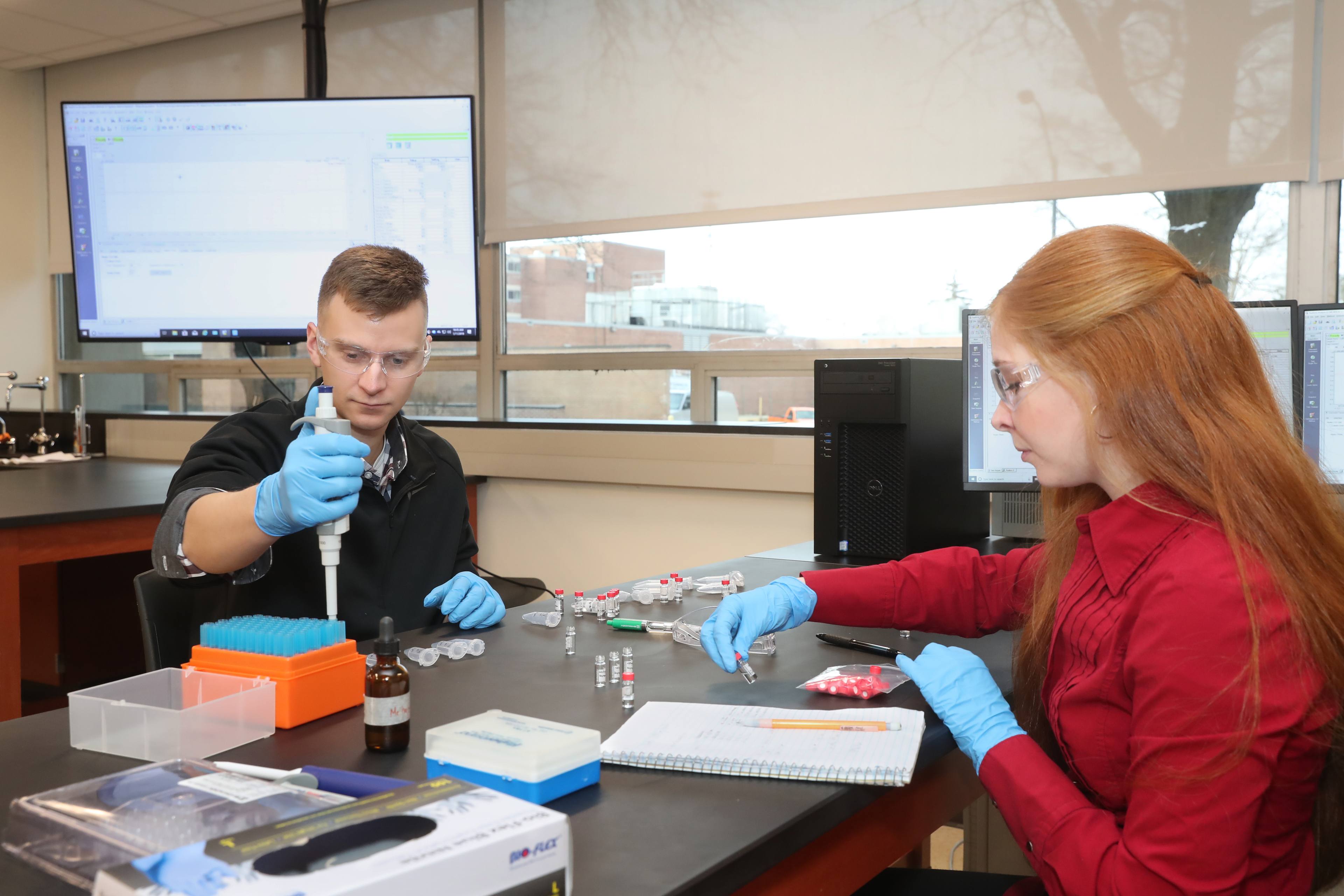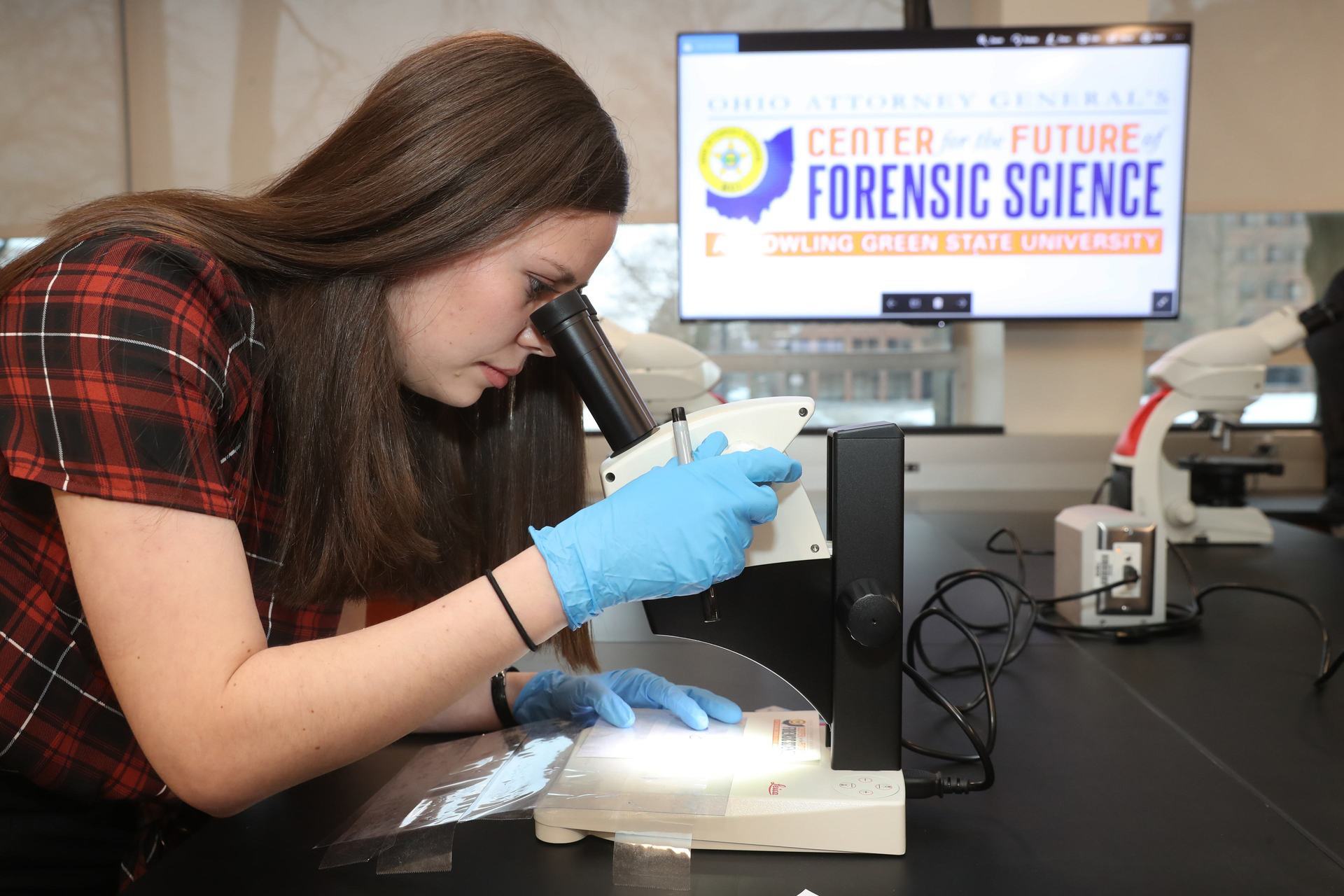
Bachelor of Science (B.S.)
Forensic Science
The BGSU forensic science degree is an undergraduate program designed to provide students the precise education and training crime laboratories require.
BGSU students who earn a Bachelor of Science with a major in Forensic Science will be prepared for immediate employment as forensic scientists or further study.
Three specializations, Forensic DNA Analysis, Forensic Drug Analysis and Forensic Examination, allow students to focus their forensics studies.
BGSU is home to the Ohio Department of Justice Bureau of Criminal Investigation Crime Lab. The nearly 30,000 square-foot, state-of-the-art facility is home to over 40 BCI staff performing investigative and laboratory services.
Unique forensic science student experiences
One of only two programs like it in Ohio, the Bowling Green State University Bachelor of Science in Forensic Science (BSFS) program recently received accreditation from the Forensic Science Education Programs Accreditation Commission (FEPAC).
The College of Arts and Sciences offers a bachelor of science in forensic science (BSFS) degree, offering specializations in Forensic DNA Analysis, Forensic Drug Analysis and Forensic Examination.
The BGSU Forensic Science Program offers students an unparalleled opportunity to prepare for careers as forensic scientists through a unique combination of:
- An on-campus Ohio Bureau of Criminal Investigation (BCI) laboratory
- Expert faculty with decades of professional crime laboratory work experience
- newly designed forensic science classroom and laboratory learning spaces
- Hands-on use of cutting-edge crime laboratory instrumentation
- 2 mock crime scene houses
Center for the Future of Forensic Science
Through an innovative collaboration, BGSU and the Ohio Attorney General’s Bureau of Criminal Investigation (BCI) launched the Center for the Future of Forensic Science to develop leaders who will revolutionize the profession of forensic science.
The Center has two primary goals, establish scholarly research to advance forensic science knowledge and provide a world-class education that trains the next generation of forensic scientists.
BGSU also offers a Master of Science in Forensic Science.
BGSU is one of the few universities in the nation that has a criminal investigation lab on the campus.
Career - what can you do with a forensic science degree?
With a BGSU forensic science degree, you will be well prepared for a career in a local, state, military, or federal crime laboratory. Your choice of career depends on your specialization, your aptitude and your ultimate goals.
The BGSU forensic science faculty and your regular exposure to professionals working at the BCI lab will help you find your forensic career path.
Understanding the different roles in an investigation will help you find where your interests lie.
For instance, while forensic investigators would identify, sample and record found substances, forensic chemists would analyze a retrieved substance to identify it, forensic toxicologists would study its effect on the body, forensic biologists would study DNA left at the crime scene, and forensic investigators would seek the identity of perpetrators.
Connecting you with opportunities and meeting practicing professionals in those roles is possible through an extensive field-based internship and close contact with professionals from the on-campus Ohio State Crime Lab.
Career paths
- DNA analyst
- Drug chemist
- Forensic toxicologist
- Trace evidence analysts
- Latent Fingerprint examiners
- Firearm and toolmark examiners
Quick Facts from the Bureau of Labor Statistics
Internships
Students are encouraged to pursue work in a lab and to consider research opportunities that are available on campus. The capstone experience involves scholarly research and a written proposal about the student’s research topic.
Curriculum
The curriculum of the Bachelor of Science in Forensic Science degree program provides the essential scientific and laboratory problem-solving skills necessary for graduate success in a modern forensic science laboratory. The program combines rigorous scientific study and laboratory training with exposure to the broader unique aspects of the practice of forensic science, including evidence collection, handling, analysis and reporting practices; specific legal and ethical considerations; and expert courtroom testimony.

Sample courses
- Introduction to Forensic Science
- Forensic Biology
- Forensic DNA Analysis
- Pharm/Toxicology Drugs of Abuse
- Latent Prints
- Trace Analysis
- Principles of Crime Scene Investigation
- Professional Responsibility
Specializations
By offering three distinct forensic science specializations within the Bachelor of Science in Forensic Science degree program (Forensic DNA Analysis, Forensic Drug Analysis and Forensic Examination), BGSU students can select the precise forensic curricula that will prepare them to achieve their career goals.
The BGSU Forensic DNA Analysis specialization provides students with the precise training crime laboratories require in the application of biology and DNA analysis to forensic evidence.
The BGSU Forensic Drug Analysis Specialization is designed for students interested in applying analytical chemistry to forensic evidence to help solve crimes.
The BGSU Forensic Examination specialization provides a strong background in both the chemical and biological sciences to gain skills in pattern evidence examination, including: latent print analysis; trace and impression evidence analysis; and recognition and analysis of basic biological evidence such as hair and bodily fluids.
Forensic Science Camp
Are you interested in how science is applied to legal investigations? Can you see yourself as a forensic scientist in a courtroom, laboratory, crime scene, classroom, or even morgue? BGSU’s Forensic Science Camp gives high school students classroom, laboratory and field experience in forensics and exposure to various careers in forensics. Learn about this exciting field at BGSU’s cutting-edge forensic science program taught by talented professionals who have even been featured on the hit-show Forensic Files!
Admissions information
Students interested in the forensic science major will be assessed on high school activities, volunteer work and overall academic performance. Admittance to the program will be based on a combined SAT score of 1200 or higher, with at least a 550 score on the math section or an ACT composite and math score of 25 or higher. Students with scores falling below those ranges may be reviewed for acceptance on an individual basis.
Forensic Science Learning Community
This community of interest in the forensic sciences is designed for BGSU students to receive targeted support to augment classroom learning and increase academic success.
The Forensic Science Learning Community is for students enrolled in the BGSU Bachelor of Science in Forensic Science degree program, or seeking a pathway to enrollment through either the Biology or Chemistry Department forensic science specializations.
The learning community provides unique opportunities beyond the classroom, including tours of crime laboratories, medical examiner offices and seeing forensic science testimony delivered in court cases.
Residence is optional to being a member of the learning community, but comes with added advantages. Forensic Science Learning Community students live, study and bond together in the Offenhauer Towers residences.
Delta Delta Epsilon
The BGSU chapter of Delta Delta Epsilon (ΔΔE) is an international honor society dedicated to stimulating academic achievement, promoting community understanding and advancing the fields of forensic science wherever possible. Membership is limited to students within the disciplines of forensic science that meet high academic criteria and are dedicated to the mission of Delta Delta Epsilon.
The Forensic Science program is in the BGSU College of Arts and Sciences and affiliated with the Center for the Future for Forensic Science at BGSU.
Accreditation
Bowling Green State University [BGSU] is accredited by the Higher Learning Commission. BGSU has been accredited by the Higher Learning Commission since 01/01/1916. The most recent reaffirmation of accreditation was received in 2022-2023, with our next reaffirmation of accreditation scheduled for 2032-2033. Questions should be directed to the Office of Institutional Effectiveness.
Request Information
Updated: 08/29/2024 10:06AM

